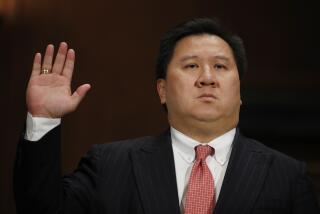Man’s Lawsuit Over Gender Mixup Nearing Conclusion
In an unusual trial nearing conclusion in Torrance Superior Court, a man who was thought to be a girl until he turned 14 is alleging that his mother’s use of the artificial hormone DES blocked his sexual development in her womb.
During the five-week trial, the man has claimed that his mother’s doctor gave her the artificial female hormone to prevent miscarriage during her pregnancy in 1947. The drug, in turn, prevented the production of the male hormone testosterone necessary for male genitalia to develop properly, leaving him with the physical characteristics of a girl, the man claims.
The man, who is suing E. R. Squibb & Sons Inc., which manufactured DES until 1968, also claims that his later bouts with testicular cancer are related to his mother’s use of the drug. The cancer is in remission.
The man, now 38, underwent surgery in the early 1960s, after doctors discovered his condition, to have his testicles brought down from the abdomen and his penis reconstructed. He grew up in the South Bay area but now lives with his wife in Northern California, where he practices veterinary medicine.
The Times is withholding the man’s name to protect his privacy.
Squibb attorneys, who are defending the company in a host of DES-related lawsuits, say they know of no other case alleging that DES could cause this type of birth defect.
Some details in the case are unavailable because Judge George R. Perkovich Jr. has refused to give reporters access to official court records, stating that some of the information could prejudice jurors if they should see or read news accounts. California case law states that records may be sealed only in exceptional circumstances after a showing of good cause.
The lawsuit, filed six years ago, claims that Squibb acted negligently by failing to determine the effects of the drug on human embryos or fetuses and ignored laboratory research done with animals that indicated that sex hormones, including DES, interfere with genital development.
“We are not dealing with a sex change in this case,” attorney Thomas Mehesan told the jurors at the opening of the trial. “The evidence will show (he) was a male at the time of his conception and has been a male since that time. He just didn’t look like a male in the genital area.”
Squibb attorneys have countered that the man was born with a naturally occurring enzyme deficiency that caused him to be born a male “pseudo-hermaphrodite”--a congenital abnormality in which the person’s external genitals resemble those of the opposite sex. During the trial, Squibb has pointed to diagnoses made by the plaintiff’s doctors in the late 1970s that concluded that he had the enzyme deficiency.
“There is absolutely no evidence today that DES in the womb can cause that enzyme deficiency,” Squibb attorney Ralph Campillo told the jury.
In the most emotional stage of the trial, the man took the witness stand and recounted for jurors his 14 years as a girl named Kathleen--a girl who shunned dresses in favor of toy guns and cowboy hats and felt increasingly out of place as puberty approached.
” . . . The very real problems started when my voice changed, and my voice changed very dramatically,” the man said. “I can remember the date, and I can remember the incident. I remember . . . I was yelling . . . for my brother John to come home for dinner, and ‘John, John, John,’ and my voice changed that fast, and from that point on I talked with the same voice I have now.”
The man testified that it was not until he sprained his ankle at school--and his mother was called to pick him up--that he and his mother decided to go to a doctor to determine whether something was wrong.
“I couldn’t take it any more,” the man said. “I talked to my mother, and I said: ‘What is going on? I don’t understand it. There is something wrong. Can’t we do something?’ ”
After examinations by doctors, it was determined that the man’s testicles had not descended, and he later underwent a series of operations. He cut his hair and changed his name.
“I still have the first sweater that I ever bought, and then shoes, you know, boy’s shoes, boy’s pants, boy’s underwear, and it was just like somebody said, after being in prison for 14 years, you (are) free, because I had been,” the man testified.
The man’s mother and adoptive father also testified.
The jurors--eight men and four women--have been barraged with conflicting testimony and complex biological explanations, such as the “17 Beta defect,” the term given to the man’s alleged enzyme deficiency.
One physician called by the man’s attorneys testified that it is very rare for a male pseudo-hermaphrodite to have the enzyme condition, and said that in his opinion the DES was responsible for the problem.
But a doctor called by defense attorneys testified that DES does not affect fetal production of testosterone, and that male pseudo-hermaphroditism does not occur more often in infants whose mothers took DES.
DES, or diethylstilbestrol, was used by millions of pregnant women from the 1930s to the early 1970s to prevent miscarriages. Studies have linked the drug to vaginal and cervical cancer in the daughters of women who took it. The drug is now prescribed only for other purposes such as to alleviate symptoms experienced by menopausal women.
Supreme Court Ruling
Although as many as 200 companies at one time manufactured DES, and the man has offered no proof that his mother took the Squibb drug, the suit seeks monetary damages from the company based on a 1980 ruling by the California Supreme Court. That ruling said manufacturers of DES could be ordered to pay damages based on their market share of the drug, so long as their market share was “substantial.” Squibb attorneys have estimated the company’s share of the market in the late 1940s at around 30%, while the plaintiff puts it at 84%.
The case originally included three other major DES manufacturers as defendants. Last year, however, a Torrance jury found that one of them, Upjohn Co., could not have produced the DES pills the man’s mother took in 1947.
As for the other companies, Eli Lilly & Co. and Abbott Laboratories, Perkovich and attorneys on both sides will say only that the case has been “concluded” with respect to them.
The plaintiff is seeking at least $9 million in damages. Jurors are expected to begin deliberations Tuesday.
More to Read
Sign up for Essential California
The most important California stories and recommendations in your inbox every morning.
You may occasionally receive promotional content from the Los Angeles Times.










